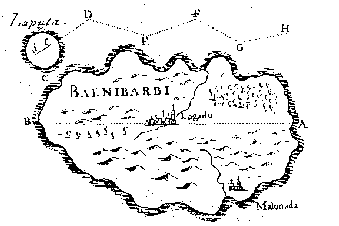
Those whom the gods wish to destroy, they first make mad.
Under normal circumstances the transfer of €1 trillion of public money to ANONYMOUS BANKERS with no meaningful audit trail would be representative of a society with corruption tolerance levels so staggeringly off the charts that they be as palpable as they be endemic.
Just contemplating such a state would have one feeling as out of place as Gulliver in Lilliput and the flying island of Laputa.
Yet this is what the European Central Bank (ECB) and the European Union (EU) have done to their own people who’ve been deprived of all national sovereignty in place of which they’ve had a currency foisted upon them over which their every national parliament and government has completely ceded control.
When I asked the EU & ECB what happened to that €1 trillion, they wouldn’t say.
The debt is on the ECB’s balance sheet – there are plenty of assets to show for it – but we’ll never know what exactly was bought, who did the buying, who off, nor for how much.
Inventing Money
The European Central Bank, the world’s third largest printer of money — behind the US Federal Reserve and the People’s Bank of China — distributed a trillion Euros to private financial institutions in exchange for various bonds over a two year period.
In November 2014 at the beginning of what became known as their Quantitative Easing (ECB QE) programme, I asked them to disclose exactly which bonds they were buying. I also asked them whom they were buying them off, the price of each bond and the amount spent on commission.
As they were spending billions of euros of public money during a time of extreme austerity – it felt quite normal that EU citizens be told where their money was being spent (and sent).
Disclosure
The only information the public had been told at that time was that the ECB were buying repackaged bank loans (Covered Bonds) and Asset Backed Securities (ABSs) in order to stop deflation and maintain inflation at 2%.
Despite the simple nature of my request — I asked for a country by country, bank by bank, product by product breakdown of what the ECB had been buying — the bank refused to disclose the full nature of its holdings.
Decision
Mid 2016, more than a year and a half after I originally asked them, the ECB — and the European Ombudsman — ruled against my appeal for transparency.
Click below for the link to the EU Ombudsman decision on the case:
But the question remains: What happened to the money?
Groupthink
Bizarrely the woman who runs the European Ombudsman, Emily O’Reilly, has a reputation for being a fair-minded adjudicator.
Also in mid-2016 the Irish papers portrayed O’Reilly as a friend of transparency who had rebuked the Irish Central Bank and the ECB for not publishing their correspondence during the Irish Bailouts of 2010.
EU Ombudsman Emily O’Reilly in ‘transparency summit’ with Central Bank https://t.co/iBfofSvRbf
— Ranjan Balakumaran (@financialeyes) December 31, 2017
If only those newspapers had known how O’Reilly has sided with the ECB’s right to hide behind ‘commercial confidentiality’ to prevent its citizens from knowing who got the trillion euros.
O’Reilly ruled in favour of the ECB without once consulting me — the complainant — to find out why I had brought the case or to let me challenge the groupthink logic of her flawed judgment.
Too little, too late
Ironically on the date of the ruling (18th July 2016) the ECB itself announced that another slice of its QE programme, the Corporate Bond Purchase Programme, would publish its ISIN codes.
This is a screenshot of the paywalled Financial Times story with the announcement about the new stance on ISIN codes.
 How funny that I had to wait 18 months to get a definitive ‘no’ on receiving the ISIN codes for the Covered Bond and ABS QE programme, only for the Corporate Bond Purchase Programme to publish its ISIN codes on the very same day.
How funny that I had to wait 18 months to get a definitive ‘no’ on receiving the ISIN codes for the Covered Bond and ABS QE programme, only for the Corporate Bond Purchase Programme to publish its ISIN codes on the very same day.
A Pyrrhic Victory perhaps?
Time will Tell.
Corruptissima respublica, plurimae leges
The most corrupt state, the most laws – Tacitus
My feeling is that the ECB don’t want the public to know how much they are protecting the very same German financiers that benefited from the ECB’s imposition of austerity, deregulation and privatisation policies in southern Europe.
I believe the worst offender is DePfa / Deutsche Pfandbriefe.
Just as the IRA and Baader Meinhoff are known for their politically inspired terror campaigns in the 1970s so has Deutsche Pfandbriefe exported financial terrorism throughout Europe from its tax avoiding, financial engineering Dublin Headquarters as of the early 2000’s when it re-domiciled to save cash.
ECB QE and commercial confidentiality for public money are the very definition of double standards and, in this case, perpetuate the myth that North Europeans are honest and that everyone else is corrupt.
I appreciate that this is not something many people are willing to accept – such is the scale of our programming.
Just as with PPP / PFI in the UK, commercial confidentiality and financial engineering remain the respectable face of corporate fascism and fraud.
This piece was originally published in July 2016. I have decided to republish. Many older londonconversation / financialeyes posts have sadly somehow disappeared. I’m treating this as a chance to reflect on and revisit some of what I’ve been up to these last few years.
I was a reluctant Brexit voter.
This post shows how strongly EU decisions are stacked in favour of capital.
Although in many ways I do regret having voted for Brexit, the fact remains that we are now closer to having a credible opposition in this country albeit one which has difficulties reconciling itself with its recent warmongering, PFI-promoting, Blairite past.
I’m not saying I feel vindicated as the signs of more equal society just aren’t there.
But I don’t think I believe the notion of economic equality is ever going to serious take root in this country again so the best we can hope for is to protect freedom, root out rampant corruption when we see it, and contemplate why, for whatever reason, it can’t be stopped.






